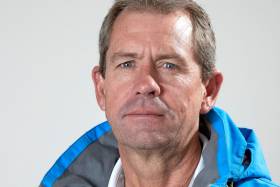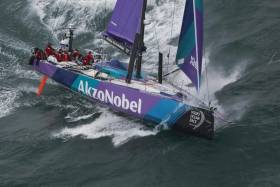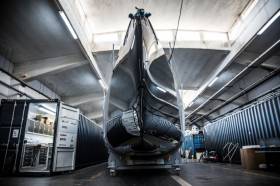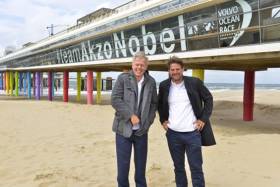Displaying items by tag: Team AkzoNobel
#VOR - Three-time Volvo Ocean Race winner Brad Jackson has been announced as skipper of Team AkzoNobel after the surprise dismissal of Simeon Tienpont at the weekend.
Jackson, who coached the Swedish all-women entry Team SCA in the 2014-15 edition, was promoted from within the crew with just days to spare before the fleet departs Alicante on the first leg this coming Sunday (22 October).
The 49-year-old New Zealander will take on the skipper role as well as his watch captain commitments shared with three-time Volvo Ocean Race veteran and 2008-09 edition winner Joca Signorini (BRA). This will be Jackson’s seventh Volvo Ocean Race.
“It’s a privilege to lead a team of people as talented and committed as this one – both on the water and on shore,” said Jackson yesterday (Monday 16 October). “The credit for the quality of team AkzoNobel should go to Simeon Tienpont.
“We have been through a difficult time since Simeon’s departure, but I’m proud of the way everyone at team AkzoNobel has responded and now it’s time for us to focus on the race.”
Jackson added: “I’m grateful for the support I have received from within the team. It’s not the ideal preparation for the race that we had hoped for, but I know we can move forward quickly and be racing hard on start day.”
Meanwhile, Simeon Tienpont has issued his own statement after Team AkzoNobel announced the termination of their relationship with his management team over “breach of contract”.
“They talk about a contract break, which is absolutely unfounded and is very damaging to my reputation, especially in view of the timing, just before the start of the race,” said the Dutch sailor, who would have been competing in his first Volvo Ocean Race as skipper.
“I can only guess that it is about a small budget overrun on a safety issue, but we have always been 100% transparent to AkzoNobel about our financial affairs and all our expenses have been made with their approval. It is them, not me, who is in clear breach of the contract.”
Scuttlebutt Sailing News has more on Tienpont’s statement HERE.
Team AkzoNobel Gives Statement On Ousting Of Skipper Simeon Tienpont
#VOR - Team AkzoNobel has released a statement after the sudden ousting of skipper Simeon Tienpont over the weekend, just days before the first leg of the 2017-18 Volvo Ocean Race.
The Dutch campaign cited “breach of contract” in their decision to terminate their relationship with Tienpont’s management company STEAM “with immediate effect”.
Tienpoint was the first skipper announced for the 13th edition of the global yachting challenge over a year ago, and the two-race veteran would have been sailing his first race in charge of a VOR 65.
Now the clock is ticking as the team rallies to find a new skipper before the fleet departs on the first leg next Sunday (22 October).
Team AkzoNobel’s statement in full:
First of all, we want to thank everyone for the many messages and comments the team has received over what has been a difficult few days for us. We appreciate every single one of them – the positive and the negative ones – and we very much value everyone’s passion for the campaign.
Right now team AkzoNobel is dealing with a challenge none of us ever expected to face. It has been tough, but the sailors and the shoreside support staff have every intention to be on the start line next Sunday for the start of Leg 1 of the Volvo Ocean Race.
The complex nature of the events that have unfolded over the last week have meant we have been unable to communicate with our supporters as openly as we would normally do so, and for that we are sorry.
The title partner and owner of the team has said:
– Simeon Tienpont’s management company STEAM breached its contract to manage the team AkzoNobel entry in the Volvo Ocean race 2017-18
– The breach was serious enough for AkzoNobel to terminate the contract with immediate effect and AkzoNobel then took over the full management of the team
– Simeon was offered the option to continue as skipper but opted not to continue and has left the team
AkzoNobel has restated to us its unwavering commitment to our entry in the Volvo Ocean Race.
The sailing team and management are working together to move forward and find the best solution for the race which starts in seven days time.
As soon as the new skipper is confirmed we will make sure our sailing fans are the first to know about it.
In the world of professional sport and particularly in major global sporting competitions like the Volvo Ocean Race, teams have to be able to deal with whatever adversities come their way.
We are all working in the best interest for the team and the Volvo Ocean Race.
Thanks once again for your support which we value even more than ever at this time.
Team AkzoNobel’s Volvo Ocean Race Yacht Rolls Into Lisbon For Final Fittings Marathon
#VOR - Team AkzoNobel’s brand new Volvo Ocean 65 has made the 2,000km journey from Persico Marine in Italy to The Boatyard in Lisbon.
Staff at the state-of-the-art facility, which began work on the rest of the fleet last October, will see that the sole new build will be fully fitted out for the demands of the Volvo Ocean Race just months away.
“This is an exciting project for us,” said Boatyard head Sam Bourne, who added that more than 20 people will be putting in up to 2,000 man hours between now and mid June to ready the boat for the water.
As previously reported on Afloat.ie, sailing apparel manufacturer Zhik (available from CH Marine in Ireland) was announced as the official technical clothing partner for the new Team AkzoNobel in the upcoming 13th edition of the round-the-world offshore yachting challenge.
#VOR - Dutch campaign Team AkzoNobel has today (Tuesday 5 July) been announced as the first entry of the 2017-18 Volvo Ocean Race – more than 15 months before the start of the next edition.
Backed by AkzoNobel – a leading global paints and coatings company headquartered in Amsterdam whose portfolio includes well-known brands such as Dulux – the boat will be led by first-time skipper Simeon Tienpont, who will be racing in his third Volvo Ocean Race.
Having made his debut as a rookie onboard ABN AMRO TWO in 2005-06, the Dutchman to the world’s toughest offshore race to join Team Vestas Wind for the final two legs of the 2014-15 edition – and is delighted to be leading his homeland's campaign.
“I’m honoured and incredibly excited to be skipper of Team AkzoNobel,” said Tienpont, 34, who has also been part of two winning America’s Cup teams – BMW Oracle Racing in the 33rd edition, and Oracle Team USA in the 34th edition – in an illustrious sailing career.
“We’re both focused on high performance and share the same passion for success,” he continued. “I can’t wait to start racing.”
Conrad Keijzer of AkzoNobel's executive committee added: “Partnering with Simeon to form Team AkzoNobel is a winning combination – he’s a true leader who puts safety and teamwork first and is both determined and inspirational.”
Meanwhile, VOR chief executive Mark Turner said he was delighted that a Dutch entry was the first to declare for the 2017-18 race.
“It’s exciting that our first team announcement comes early in the cycle, is backed by a global brand, and features a first-time skipper," he said. "Those are three great positives for the Volvo Ocean Race.”
Turner also made note of the recently confirmed route for the next edition, which features "more action, more speed, more tough miles and more host venues".
Team AkzoNobel marks a revival of what's been a winning tradition for Dutch sailing in the Volvo Ocean Race and its predecessor the Whitbread, with Dutch teams having lifted the trophy three times, – in 1977-78, 1981-82 and 2005-06.
Dutch sailing legend Conny van Rietschoten remains the only skipper in the history of the race to have won two editions in a row.
And Tienpont, who in 2013 won the prestigious Conny van Rietschoten trophy, the highest honour in Dutch sailing, is proud to be following in the ‘Flying’ Dutchman’s footsteps.
“The Netherlands are very fond of this race and that’s all because of Conny van Rietschoten,” he said. “He brought the event, then called The Whitbread, to an entirely new level. He built his boat in an excellent Dutch boatyard and recruited professional sailors from all around the world.”
Visiting 11 cities across five continents, the Volvo Ocean Race represents a unique opportunity for AkzoNobel, which has a presence in over 80 countries, to showcase its products before a huge global audience.
“Add in Simeon’s impressive track record and it’s this irresistible combination of experience, tradition, expertise and human endeavour which will prove so vital once the world’s premier offshore race is underway," said Keijzer.
To celebrate the announcement of the Dutch team in The Hague, the Scheveningen pier underwent a colourful makeover, which will remain a remarkable eye-catcher until the race finishes with a grand finale in The Hague in summer 2018.

































































